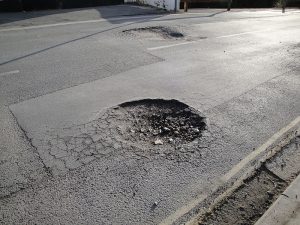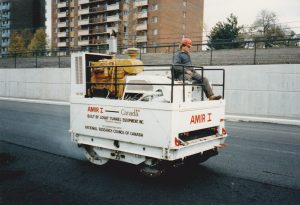“In The Glebe, Ottawa, Ontario, Canada” by Hodnett Canoe is licensed under CC BY-SA 4.0
Complaints about graffiti in Ottawa are on the decline according to an analysis of the city’s service requests data.
As of August 2017, the dataset shows complaints are down nearly 50 per cent from 2014, or by a total of 239 complaints.
According to the data, complaints reach a yearly spike between April and June, while colder months like January see as few as eight complaints compared to 73 seen in June last year.
The City of Ottawa defines graffiti on its website as the “etching, painting or placing of a mark on public or private property”. Whether on public or private property, graffiti is an act of vandalism under the city’s graffiti management bylaw and vandals can face fines of $615.
City Council enacted the Graffiti Management By-law 2008-1 which makes placement of graffiti a bylaw violation as opposed to dealing with vandals under the Criminal Code.
Charge for graffiti under the code is “mischief under or over $5,000”. Graffiti vandals may be subject to additional community service hours and or criminal charges that could result in a criminal record.
City bylaw manager Roger Chapman said in an email statement that the majority of graffiti-related complaints involve tagging, which is writing or painting an identifiable symbol or “tag”.
Chapman attributes the decline in complaints to the prompt removal efforts and prevention initiatives, such as the Mural Program, which he says has proven effective in discouraging graffiti vandalism.
He says prompt cover-up or removal of graffiti is the most effective method of combating the problem because vandals want their work to be seen, so if graffiti is removed quickly, future acts are discouraged. The sooner graffiti removal is attempted, the easier and more effective it is.
The Mural Program works to discourage unsolicited graffiti while promoting arts and culture within the city. As a part of the program, art professionals can apply to design mural projects, which are large-scale wall paintings on designated underpasses across the city.
The City of Ottawa also has three legal graffiti walls which are free spaces where graffiti is permitted and encouraged.
Albert Street Education Centre Retaining Wall located 422 Slater Street is one of the city’s legal graffiti walls.
Sandy Hill resident Hannah Kim says, “When I see graffiti, I see it as a form of art, not vandalism.”
Sandy Hill is part of Ottawa’s Rideau-Vanier ward, which also covers most of the ByWard Market, Lowertown and Vanier neighbourhoods and sees the highest amount of graffiti complaints across the city annually.
Kim says the graffiti doesn’t bother her as she feels it adds to the urban feel of the community.
“Coming from a city like Toronto, I really like the vibe and the vibrancy that the art pieces bring to my neighbourhood,” she adds.
Kim says the only time when she would make a complaint about graffiti would be if the vandalism propagated hate speech. “I don’t want to see that kind of stuff in my community because I feel like it just brings down the whole morale,” she adds.
Ottawa’s most recent case of hate-motivated graffiti happened during November last year, when a teen vandalized two synagogues, a mosque, a Jewish prayer house and church with racist slurs and symbols like swastikas with red paint.
Kim says incidents like this although rare would in fact deter her from living in such areas as a woman of colour.
Chapman says community members play a vital role in keeping their neighbourhoods graffiti free. When residents see graffiti, they are encouraged to report it by calling 3-1-1 or report the incidents online. Due to the sensitive nature of hate graffiti, the city urges residents report incidents by calling in immediately.




















